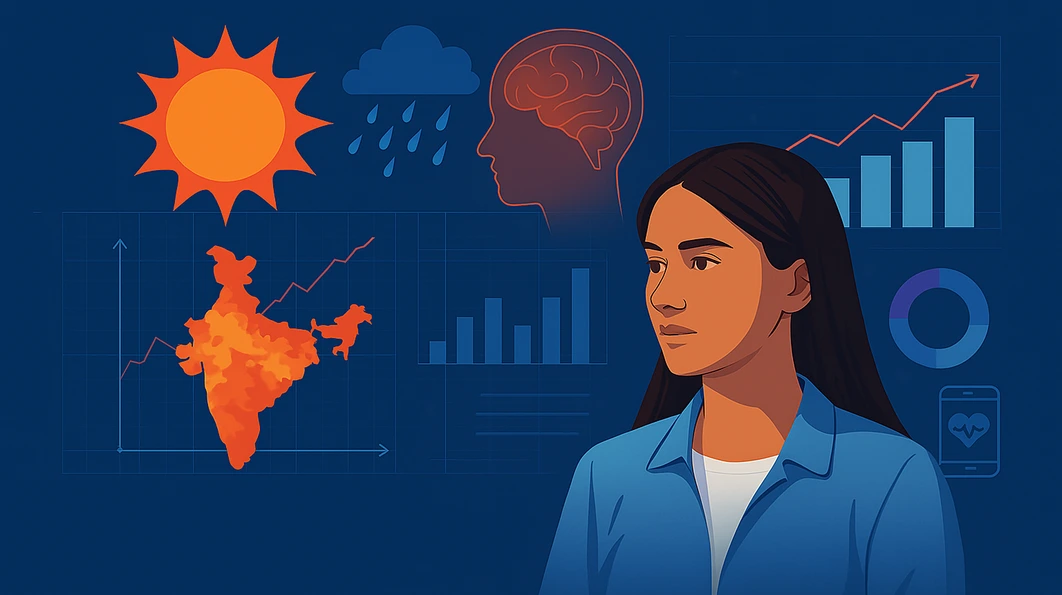New Delhi / Global – Amid one of India’s most extreme heatwaves in 2025 with temperatures soaring beyond 48 °C across Rajasthan, Delhi, and Odisha experts argue that Master of Public Health (MPH) graduates are urgently needed to fortify the nation’s response. Armed with skills in technology, data, and empathy, MPH professionals are uniquely positioned to tackle the intertwined threats of heat stress, water-borne disease surges, and growing mental health risks.

A Public Health Crisis That Needs Technology, Data and Empathy – All Together With The Graduated MPH
The Silent Emergency Sweeping India: Heat, Humidity & Health Breakdown
In the summer of 2025, India faced one of its most extreme heat waves in history, with temperatures crossing 48 ° C in Rajasthan, Delhi and parts of Odisha. As the monsoons approach, the crisis deepens. Sudden rainfall in scarce land are triggering a peak in water -borne diseases, while persistent thermal stress is having an invisible – but deadly -: Mental health collapses.
WHO estimates that by 2030, climate-related factors will cause more than 250,000 additional deaths annually and a growing number of them will involve stress, depression, anxiety and suicide induced by heat.
But here is the alarming part: India’s public health infrastructure is not yet ready to address this intersection of heat and mental health.
This is where MPH Graduates form of institutes such as Ramyanti Institute of Health and Sciences (RIHS) come in.
Climate Change Is No Longer a Future Threat – It’s a Daily Health Reality
Of the sudden floods from Uttarakhand to Odisha’s heatstroke deaths, climate -linked health emergencies are now weekly headlines. However, India’s public health approach remains reactive, not resilient.
Public Health Gaps Identified in Current Crisis:
- No integration of mental health in district Heat Action Plans (HAPs)
- Lack of surveillance for early signs of heat-stress-induced mental fatigue
- Poor interdepartmental coordination between health, environment, and urban planning bodies
- Shortage of trained personnel to bridge health data, tech, and community response
Key Data:
- 150+ heatwave-related deaths in India (April – May 2025) reported across 9 states
- Over 50,000 cases of dehydration, heatstroke, and related illnesses recorded by state health departments
- Mental health hotline calls increased by 24% during May alone, as per iCall and Fortis Mental Health Network reports
How MPH Graduates From RIHS Are Trained to Respond
At RIHS, the master of the Public Health Program goes beyond the theory of the classroom. It is designed to prepare students for real -world crises, mixing:
| Core Skill | Applied Role in Heat-Health Crisis |
| GIS Mapping & Spatial Epidemiology | Create risk maps of heatstroke-prone zones in cities and slums |
| Digital Surveillance Tools | Monitor illness spikes during heatwaves using mobile dashboards |
| Mental Health & Climate Curriculum | Design community workshops to build psychological resilience |
| Public Health Policy & Management | Assist district magistrates in updating Heat Action Plans |
| Data Analytics in Health | Interpret weather-health trends for early warning systems |
Why Mental Health Must Be Central to Climate Resilience
The heat does not only harm the body. He overloads the nervous system, leading to:
- Higher rates of agitation, anxiety, and emotional exhaustion
- Suicide rates rising by 1.4% for every 1°C rise in average temperature (Lancet, 2023)
- Workforce productivity dropping due to poor concentration and heat fatigue
However, most district health systems do not examine these effects. With a trained MPH workforce, this gap can be closed.
The RIHS Model for Integration:
- Train students to screen for climate-linked mental distress during field visits
- Partner with local government to include mental health in HAPs
- Develop digital heat-health surveys using tools like KoboToolbox & ODK
Real-Time Applications: What MPH Students Can Do During Crisis
| Real-Life Action | MPH Student Role |
| Monsoon after heatwave → Dengue outbreak | Conduct field surveys + digitize case reports for rapid response |
| Mental fatigue in vulnerable women | Use WHO mhGAP protocol for community mental health |
| Water scarcity and temp spikes | Map high-risk areas and inform community-level interventions |
In 2024, Ahmedabad added awareness of mental health to his thermal action plan. RIHS is preparing students to climb these models in the vulnerable cities of India.
Career Pathways for MPH Graduates in a Climate-Hit India
| Career | Where |
| Climate & Health Program Officer | WHO, IIPH, NRHM, NDMA |
| GIS & Heat Risk Analyst | Smart City Missions, Urban Labs, Disaster Response Units |
| Public Health Data Manager | State Surveillance Units |
| Mental Health Coordinator (Community) | NGOs, UNICEF, District Mental Health Programs |
| Digital Health Strategist | Telehealth platforms, CSR programs, startups |


